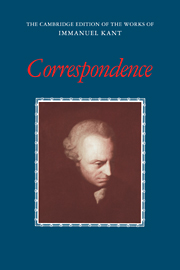Book contents
- Frontmatter
- Contents
- General Editors' Preface
- Acknowledgments
- Introduction
- Letters before 1770
- Letters 1770–1780
- Letters 1781–1789
- Letters 1790–1794
- 1790
- 1791
- 1792
- 1793
- 1794
- Letters 1795–1800
- Public Declaration concerning Fichte's Wissenschaftslehre, August 7, 1799
- Biographical Sketches
- Glossary
- Index of Persons
1791
from Letters 1790–1794
Published online by Cambridge University Press: 07 September 2010
- Frontmatter
- Contents
- General Editors' Preface
- Acknowledgments
- Introduction
- Letters before 1770
- Letters 1770–1780
- Letters 1781–1789
- Letters 1790–1794
- 1790
- 1791
- 1792
- 1793
- 1794
- Letters 1795–1800
- Public Declaration concerning Fichte's Wissenschaftslehre, August 7, 1799
- Biographical Sketches
- Glossary
- Index of Persons
Summary
Esteemed Sir,
Herr Nicolovius who has the honor of delivering this letter to you, is a former auditor of mine and a very fine young man. He would like to make the acquaintance of some of the people in your circle of friends during his brief stay in Eutin. Getting to know such people is often impossible in large cities, yet so good for one's heart and mind. His modest demeanor ensures that his request will cause you no trouble.
The penetrating observations you made in your letter will give me much food for thought. For the present, since I have not found the time to give sustained thought to your suggestions, I must beg you to be contented with my still unripe judgments.
First, concerning the analogy between colors and tones, you certainly bring into focus the issue of their relation to judgments of taste (which aim to be more than mere sensory judgments about what pleases or displeases). Your graduated scale of vowel sounds, the only sounds, you maintain, that can produce a distinct tone by themselves, seems to me to be unnecessary here. For no one can think music that he is not able, however clumsily, to sing – and this at the same time shows clearly the difference between colors and tones, since the former do not presuppose any such productive power of the imagination.
- Type
- Chapter
- Information
- Correspondence , pp. 372 - 397Publisher: Cambridge University PressPrint publication year: 1999

